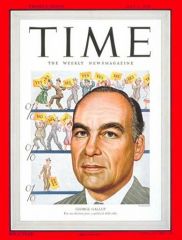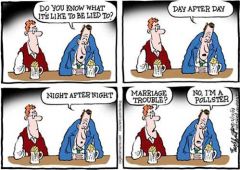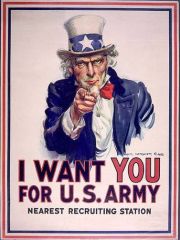![]()
![]()
![]()
Use LEFT and RIGHT arrow keys to navigate between flashcards;
Use UP and DOWN arrow keys to flip the card;
H to show hint;
A reads text to speech;
19 Cards in this Set
- Front
- Back
|
public opinion
|
What the public thinks about a particular issue or set of issues at any point in time.
|
|

George Gallup
|
An American pioneer of survey sampling techniques and inventor of the Gallup poll, a successful statistical method of survey sampling for measuring public opinion.
|
|
|
political socialization
|
The process through which an individual acquires particular political orientations (beliefs and values).
|
|
|
political ideology
|
The coherent set of values and beliefs about the purpose and scope of government held by groups and individuals.
|
|
|
tracking polls
|
Continuous surveys that enable a campaign to chart its daily rise or fall in support.
|
|
|
exit poll
|
Poll conducted at selected polling places on Election Day.
|
|
|
sampling error
|
A measure of the accuracy of a public opinion poll
|
|

What are the shortcomings of polls?
|
Sampling error
Limited respondent options Lack of information Failure to measure intensity |
|

What have been some historical examples of attempts to influence public opinion in America?
|
Paul Revere's Engraving of the Boston Massacre
Thomas Paine's Common Sense, Alexander Hamilton and James Madison's Federalist Papers, Harriet Beecher Stowe's Uncle Tom's Cabin, U.S. Government propaganda during World War I, Embedding of reporters with U.S. troops during Iraq War |
|
|
What factors influence political socialization?
|
Family, school, peers, media, religion, race/ethnicity, gender, age, region, and impact of events.
|
|
|
push poll
|
Poll taken for the purpose of providing information on an opponent that would lead respondents to vote against that candidate.
|
|
|
poll
|
Survey that can measure name recognition, ad effectiveness, public perception of candidates, and public opinion of issues
|
|
|
political party
|
A group of office holders, candidates, activists, and voters who identify with a group label and seek to elect to public office individuals who run under that label.
|
|
|
Governmental party
|
Members of a political party who hold elected office.
|
|
|
Organizational party
|
Members of a political party who work directly for the political party.
|
|
|
Party in the electorate
|
People who identified themselves as members of a political party and vote in primaries and general elections.
|
|
|
Rational Choice Theory
|
A political science theory that assumes that individuals act in their own best interest, carefully weighing the costs and benefits of possible alternatives; seeks to explain the actions of voters and politicians
Voters want to maximize the chance that policies they favor will be adopted by government Parties want to win office Successful political parties rarely stray from the midpoint public opinion; centrist parties with many similarities |
|
|
linkage institution
|
Institutions that connect people to the government; Elections, Political Parties, Media, and Interest Groups
|
|
|
What are the functions of a political party?
|
Linkage institution
Mobilize support for a candidate or issue Create stability and moderation in government Create unity and accountability in government Create national party platform - government's agenda |

